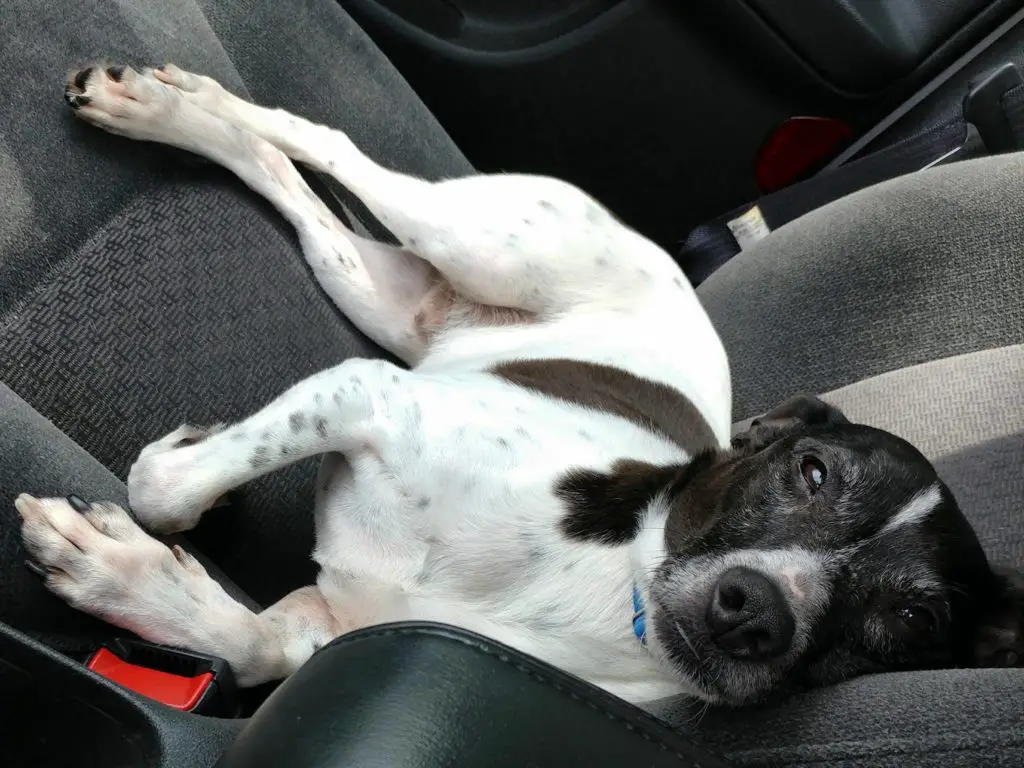Table of Contents
*This post may contain affiliate links. As an Amazon Associate we earn from qualifying purchases.
Can a dog suffer from anxiety? Only someone who has never loved a dog would doubt it. Dogs are emotionally complex creatures, and, just like humans, they have worries, too. Sometimes their anxiety is caused by specific things — thunder, separation from loved ones, some medications — and sometimes it just happens.
Fortunately, there are a number of ways you can help your pup through it.

Anxiety in Dogs
A dog may experience anxiety in response to a number of things. Some of these things, like thunder, are pretty well known. But anxiety can also stem from certain illnesses, such as thyroid disease or a viral infection; exposure to toxic substances, pain, poor early socialization, and traumatic experiences. It can also be part of the aging process. Dogs can even have phobias!
Some anxieties are associated with different stages of development. According to Pet MD, one kind of anxiety occurs at around 8 to 10 months of age. Phobias and social anxieties often manifest at one to three years of age. And elder dogs can develop age-related anxiety as well.

Some symptoms include:
- Trembling
- Panting
- Hiding
- Peeing where they’re not supposed to
- Tail-tucking
- Hyperactivity
- Diarrhea
- Licking and biting at oneself
If your dog seems anxious or fearful, it’s important to see your vet to rule out causes, such as illness, that need their own treatment.
What Will The Vet Say?
First, your vet will probably conduct blood tests, and other medical tests, to rule out infections, injury, and illness. Then it will be time to discuss treatment options.
Some Possible Anxiety Treatments
When it comes to treating canine anxiety, there are quite a few options. It’s important to work with your vet to find the best one for you and your pup.

Veterinary medications
Your vet may suggest an anti-anxiety medication, but many vets prefer this to be a last resort in severe cases. Many medications are meant for situational, rather than continuous use. And with others, your vet may recommend for short-term use.
Some medications include SSRIs, tricyclic antidepressants, and sedatives.
Pheromone treatment
Dogs with mild anxiety sometimes benefit from pheromone treatment. These treatments include synthetic versions of the hormones a mother dog gives off to calm her pups during nursing. Pheromone products include aroma diffusers, sprays, and collars.
Behavioral treatment
Your vet may also recommend behavioral treatment. This means working with your dog to help him or her overcome their fear of whatever is making them anxious. These techniques will depend on your dog, their type of anxiety, and the stimulus that is causing that anxiety.

CBD Oil
CBD (Cannabidiol) is a compound found in the cannabis plant. It has no psychoactive properties, and is legal in most places. CBD oil is made by extracting CBD from the plant, and mixing it with a carrier oil.
Although more research is needed, early studies have shown that CBD has promise for alleviating anxiety. It’s thought that CBD works by acting on the serotonin receptors of the brain. Serotonin is a chemical that regulates mood and behavior.
As with any medication or supplement, dosage and concentration are important. So if you’re thinking about using CBD oil for your pup’s anxiety, talk to your vet to learn how much to give, and how often.
Thunder Shirts
A Thunder Shirt is a snug-fitting garment meant to be used situationally. It calms a dog in a similar way that swaddling comforts a baby. The shirt fits around the dog’s body, securing with velcro across the chest and under the belly. It leaves the dog’s head, tail, and legs free.
It’s Up to You

Our dogs can’t tell us what’s wrong. But a pet parent can often tell when something’s not quite right. Subtle changes in your pet’s behavior, or just acting “off” could be a sign of any number of different problems. And when it comes to your best friend’s health, better safe than sorry.
If your dog is showing signs of anxiety, make that appointment! There are a lot of different treatment options to have your buddy feeling themselves again.
Featured Image: Public Domain by Karen Arnold, via Public Domain Pictures

